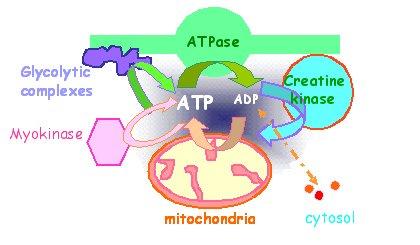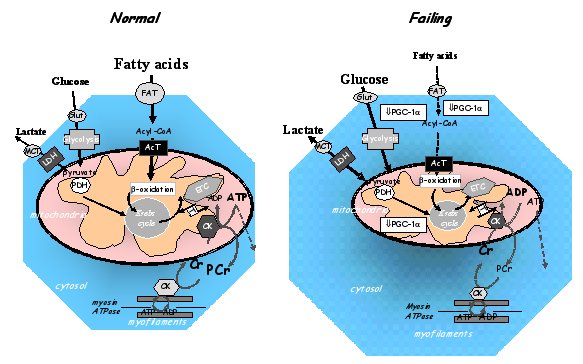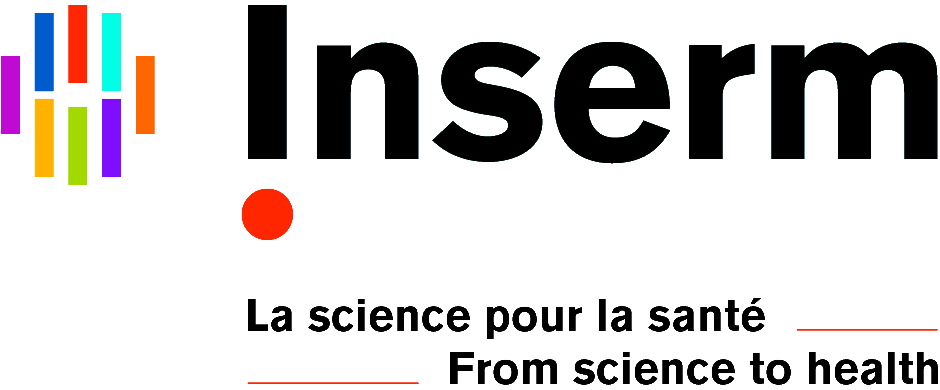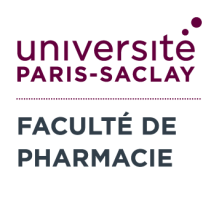Energy signalling and cardiovascular pathophysiology
MERICSKAY Mathias, DR2 Inserm : Team leader
GARNIER-FAGART Anne, PU Université-Paris-Saclay : Team leader
VEKSLER Vladimir, PU Emérite Université-Paris-Saclay
VENTURA-CLAPIER Renée, DR Emérite Cnrs
GAIGNARD Pauline, MCU-PH Université-Paris-Saclay
KAROUI Ahmed, MCU Université-Paris-Saclay
LEMAIRE Christophe, MCU UVSQ
MOMKEN Iman, MCU UEvry
PIDOUX Guillaume, CR Inserm
PIQUEREAU Jerôme, MCU Université-Paris-Saclay
GRESSETTE Mélanie, IE Université-Paris-Saclay
DELOUCHE Morgane, AI CDD
BOSCIONE Alice, IE CDD
BALATSKII Aleksandr, Post-doc
DONATE PUERTAS Rosa, Post-doc
OUKILI Imane, PhD Student
ZHAO Zhenyi, PhD Student
Cellular bioenergetic can be defined as the study of integrated biochemical and biophysical processes of energy conversion, and of their regulation. This discipline is particularly relevant to cardiac and skeletal muscle pathologies, first of all, to heart failure (HF). Indeed, the severity of energy state of the failing myocardium proved to be a prognostic factor of mortality in HF patients. Moreover, HF patients suffer from exercise disability and abnormal fatigue linked in part to muscle weakness. Energetic deficiency also affects skeletal muscle and diaphragm evidencing the concept of “generalized metabolic myopathy of HF”. This physical handicap affects their quality of life and work ability. Despite involvement of energy metabolism in the pathophysiology of HF, our knowledge of its regulation is still rudimentary, at the fundamental as well as pathophysiological and therapeutic levels.
 Cardiac and skeletal muscles are characterized by a wide functional diversity, high and fluctuating energy needs and a variety of cell signaling pathways controlling energy metabolism. These pathways are intimately linked to cell architecture and compartmentalized enzyme systems and efficient and tissue specific systems of energy production and transfer. All these characteristics are altered in failing cardiac and skeletal muscles. This fact points to the importance of fundamental and applied studies of energy signaling in muscle cells.
Cardiac and skeletal muscles are characterized by a wide functional diversity, high and fluctuating energy needs and a variety of cell signaling pathways controlling energy metabolism. These pathways are intimately linked to cell architecture and compartmentalized enzyme systems and efficient and tissue specific systems of energy production and transfer. All these characteristics are altered in failing cardiac and skeletal muscles. This fact points to the importance of fundamental and applied studies of energy signaling in muscle cells.
Our aim is to better understand the modulation of energy metabolism and energy fluxes in cardiac and skeletal muscle cells in physiological and pathological conditions, starting from the study of subcellular compartments and their interactions to integrated physiology.
We have pursued three main lines of research:
- We study how cytoarchitecture, molecular composition and energetic of myocytes and their interactions determine contractile function.
- We progress in the identification of the extracellular signals and signaling pathways involved in energetic plasticity of healthy and pathologic cardiomyocytes.
- We demonstrate the involvement of the transcriptional regulation of mitochondrial biogenesis in heart failure and studied the energetic status of the myocardium of congestive HF patients and heart transplant recipients. We have delineated the beneficial effects of exercise training on energy metabolism in cardiac and skeletal muscle of in HF.







 Subscribe to RSS Feed
Subscribe to RSS Feed
